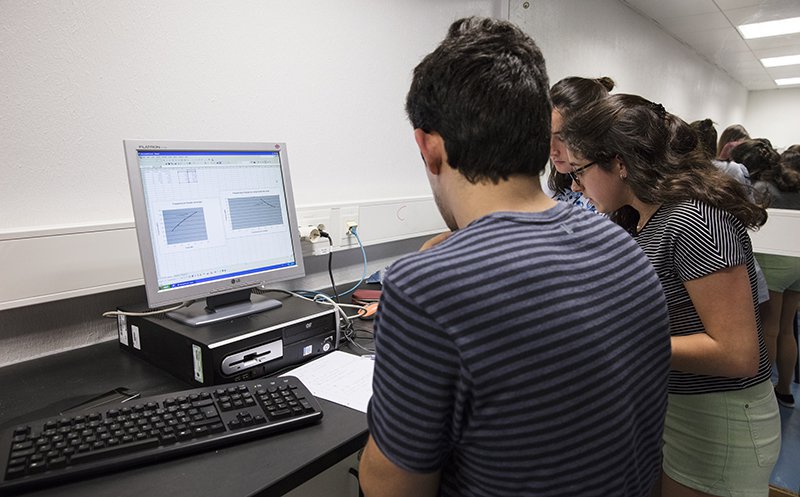Physics Teaching at Técnico

Knowing Physics is knowing the fundamental principles by which the Universe and all technology govern themselves; it is also learning to reason, and apply the scientific method in research and in the way of thinking about the world and society. It's knowing and being able to predict, and being prepared for surprises. Physics is part of the basic training in the curriculum of all the courses of the Instituto Superior Técnico, where concepts and principles are learned that are fundamental and structuring for the understanding of natural phenomena and for a solid training in engineering.
It is through Physics that the engineer perceives how matter is made and how it moves, deforms or fractures. It is through the basic principles of electromagnetism that we explain what light is, and how an electric guitar, a radio, a radar, or an induction stove works. It is the deep knowledge of light that allows the construction of telescopes capable of overcoming atmospheric fluctuations to observe the Universe at all wavelengths of the electromagnetic spectrum. Quantum Mechanics establishes the principles of quantum computing or quantum cryptography, and how nanomaterials work, allowing the creation of new structures with unique properties. It is also the quantum principles that help us create super-resolution electron or optical microscopes to study viruses. Many of the technological developments made in Particle Physics are now being used to create new instruments in medicine for therapeutic purposes or new diagnostic techniques. And who would have thought that the study of black holes would lead to a deeper knowledge of terrestrial seismic activity?
So, welcome to Physics.
At Técnico it is possible for all master's students (2º cycle of studies) to deepen their knowledge in areas of physics, through enrollment in minors.
Minors (2º Cycle) with Physics:
Space Sciences and Technologies
Quantum Sciences and Technologies
Electronic Instrumentation and Data Acquisition Systems
Nanoengineering and Microsystems
Photonic Technologies
In addition, in all the Bachelor's degrees of the Technician there is a curricular component where the laws of Physics are explained. This aspect is fundamental to understand how technology is born from the application of these laws. In this list you will find all the degrees of the Technician for which the DF contributes with the teaching of basic physics curricular units. The success of these Units is attested by the frequent distinction of excellent teacher by students of other courses.
Aerospace Engineering (Electromagnetism and Optics, Introduction to Quantum Mechanics, Relativity)
Environmental Engineering (Mechanics and Waves, Electromagnetism and Optics)
Naval and Ocean Engineering (Electromagnetism and Optics, Introduction to Quantum Mechanics, Relativity)
Biological Engineering (Physics I, Physics II)
Biomedical Engineering (Physics I, Physics II, Quantum Mechanics)
Civil Engineering (Mechanics and Waves, Thermodynamics and Statistical Physics)
Electronic Engineering (Physics I, Physics II, Physics III)
Electrical Engineering (Physics I, Physics II, Physics III)
Engineering in Industrial Management (Physics I, Physics II)
Eng. Geological and Mines (Introduction to Experimental Physics, Physics I, Physics II)
Computer and Computer Engineering (Physics I, Physics II)
Materials Engineering (Mechanics and Waves, Electromagnetism and Optics)
Mechanical Engineering (Electromagnetism and Optics, Introduction to Quantum Mechanics, Relativity)
Chemical Engineering (Mechanics and Waves, Electromagnetism and Optics)
Engineering in Telecommunications and Informatics (Mechanics and Waves, Electromagnetism and Optics)
Applied Mathematics and Computing (Mechanics and Waves, Thermodynamics and Statistical Physics, Electromagnetism and Optics)